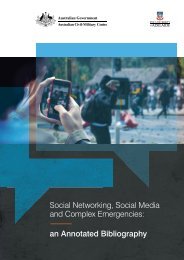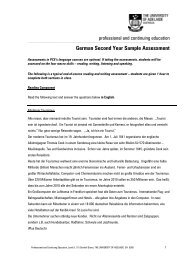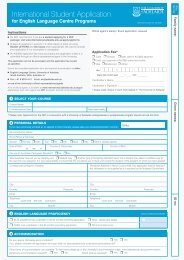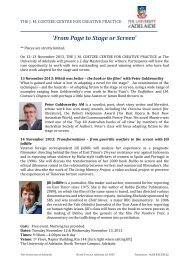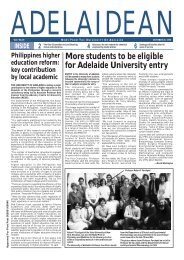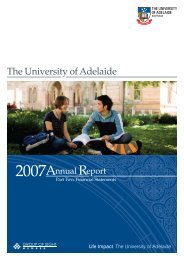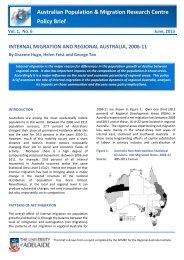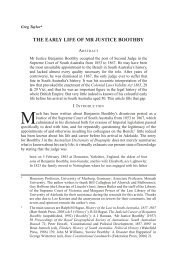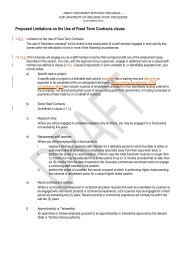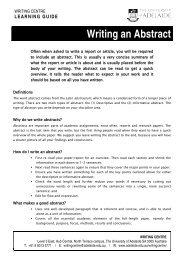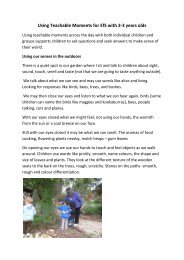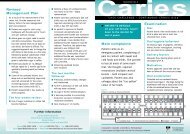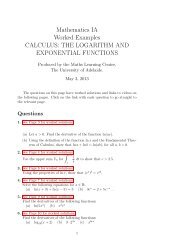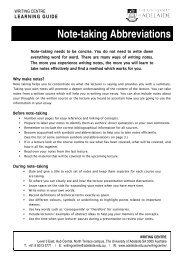Unbridling the Tongues of Women - The University of Adelaide
Unbridling the Tongues of Women - The University of Adelaide
Unbridling the Tongues of Women - The University of Adelaide
Create successful ePaper yourself
Turn your PDF publications into a flip-book with our unique Google optimized e-Paper software.
<strong>Unbridling</strong> <strong>the</strong> tongues <strong>of</strong> women<br />
Many <strong>of</strong> <strong>the</strong>m belonged to <strong>the</strong> few large families which, by intermarrying extensively,<br />
bound <strong>the</strong> congregation toge<strong>the</strong>r with ties <strong>of</strong> kinship and established a common<br />
culture among <strong>the</strong>m. Family ga<strong>the</strong>rings at Hazelwood to perform home-made<br />
burlesques set <strong>the</strong> pattern for social ga<strong>the</strong>rings in <strong>the</strong> Unitarian Church Hall. 37 And<br />
several members <strong>of</strong> <strong>the</strong> congregation were also engaged, according to <strong>the</strong>ir lights, in<br />
a variety <strong>of</strong> educational enterprises outside <strong>the</strong>ir own community.<br />
John Baker, one <strong>of</strong> <strong>the</strong> church’s 12 founders, and an elected member <strong>of</strong> South<br />
Australia’s first and second partly elected Legislative Councils, would probably have<br />
liked to make education universally compulsory. In debates on <strong>the</strong> Constitution<br />
for South Australia, to come into force with self-government in 1857, he sought to<br />
disenfranchise <strong>the</strong> uneducated. In his speech after laying <strong>the</strong> foundation stone <strong>of</strong> <strong>the</strong><br />
Unitarian Christian Church in Wakefield Street in 1857, he berated parents who<br />
put <strong>the</strong>ir children to work instead <strong>of</strong> sending <strong>the</strong>m to school, ignoring <strong>the</strong> financial<br />
necessities <strong>of</strong> labouring families and asserting that ‘In this colony, where every man<br />
can educate his children, <strong>the</strong>re can be no excuse for <strong>the</strong> prevalence <strong>of</strong> ignorance’. 38<br />
Arthur Hardy, ano<strong>the</strong>r <strong>of</strong> <strong>the</strong> church’s founders, erected and presided over a<br />
mechanics institute in <strong>the</strong> village next to his house and property at Glen Osmond,<br />
aiming to keep his quarry workers out <strong>of</strong> <strong>the</strong> public house in <strong>the</strong> evenings and to<br />
enhance <strong>the</strong>ir education. 39 Three o<strong>the</strong>r Unitarians were closely associated with <strong>the</strong><br />
South Australian Institute which for many years sustained <strong>the</strong> reputation <strong>of</strong> being<br />
one <strong>of</strong> <strong>the</strong> principal education factors in <strong>the</strong> colony. 40 <strong>The</strong> most active <strong>of</strong> <strong>the</strong>m,<br />
John Howard Clark, also taught and examined students at J.L. Young’s <strong>Adelaide</strong><br />
Educational Institution, wrote book reviews, literary articles and comic verses for<br />
<strong>the</strong> Register, and from 1870 to 1878 was its editor. He joined <strong>the</strong> South Australian<br />
Society <strong>of</strong> Arts, and he chaired <strong>the</strong> meeting which formed <strong>the</strong> <strong>Adelaide</strong> Philosophical<br />
Society (later <strong>the</strong> Royal Society <strong>of</strong> South Australia), becoming <strong>the</strong> first secretary<br />
<strong>of</strong> that would-be august body. 41 His activities <strong>of</strong>fered a Unitarian example to South<br />
Australian society.<br />
However, <strong>the</strong> Unitarians were educators and disseminators <strong>of</strong> culture not only<br />
because <strong>the</strong>y were <strong>the</strong>mselves well educated, and not only because such activity<br />
conformed to <strong>the</strong>ir church’s teaching; <strong>the</strong>y also had <strong>the</strong> time and financial resources<br />
to devote to such aims. A few <strong>of</strong> <strong>the</strong> congregation were leading colonists. <strong>The</strong> Bakers,<br />
<strong>the</strong> Everards, <strong>the</strong> Hardys and <strong>the</strong> Martins conformed to Wakefield’s ideal <strong>of</strong><br />
<strong>the</strong> gentleman immigrant who invested in land. <strong>The</strong>y were early colonists, a source<br />
70



